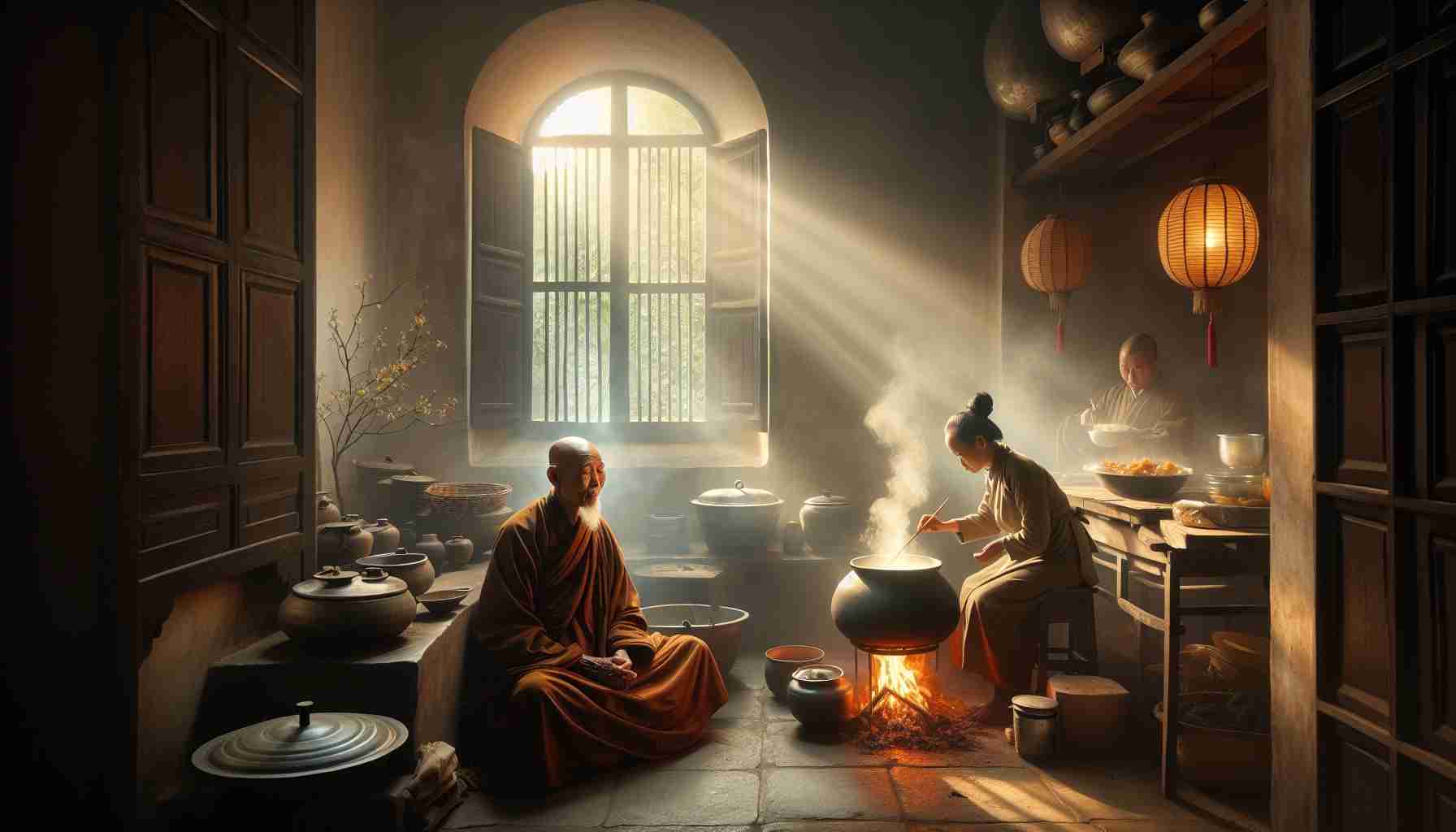

A gentle breeze drifted through the village as I stirred a pot of stew. My name is Mei, and I was the cook for the local monastery. Some people said I made the best noodles in the river valley. But today, my hands were shaking, my heart heavy with worry. A messenger had come—General Han and his army were marching near our village.
The monks were calm, as always. Brother Ming, the oldest among them, still swept leaves like nothing was happening. I couldn't understand it. If an army came, what would happen to our peaceful home?
That evening, as I burned the rice—I was too distracted—Brother Ming sat by me. He didn’t look upset. Instead, he smiled gently and watched the flames of the stove dance.
“Cooking,” he said, “is much like life. If you stir too fast, you spill. If you burn the fire too hot, your food is ruined.”
I scoffed. “But Brother Ming, there’s a war coming. Shouldn’t we do something?”
He looked at me and nodded toward the rice. “Let it sit,” he said. “Let the heat do its work slowly.”
I didn’t answer. That night, I lay awake, listening to every sound outside.
The next morning, the village buzzed with fear. Soldiers from General Han’s army had arrived. Dust rose as boots hit the ground. But something strange happened. The soldiers didn’t shout or fight. They were just... hungry.
Brother Ming walked to the front and bowed. “You must be tired,” he said. “Please, come eat with us.”
I couldn’t believe it. But under his calm gaze, I returned to my kitchen. I made noodles. I stirred stew. One by one, dusty soldiers came in, their hard faces softening as they ate.
The general himself came in last. He looked around at the peaceful garden, the monks sipping tea, the soldiers smiling as they ate. He said nothing, just sat and drank a bowl of broth.
The next day, the army left. No battles broke out. No harm was done.
I sat beside Brother Ming while we peeled potatoes. “Why didn’t you tell them to leave?” I asked.
He smiled, pressing his hand to his heart. “Because water wears down stone, not by force, but by flowing gently. Sometimes the best action is no action at all.”
That day, something inside me shifted. I always thought life needed adjusting—more spice here, more control there. But maybe, just maybe, letting things unfold naturally was more powerful than rushing in with worry and plans.
Now, when I cook, I don’t force the fire. I let it dance. I watch. I wait. There is freedom in that stillness—just like the Tao teaches.
I didn’t understand it all at once. But now, when life gets messy, I try not to stir too hard. I breathe. I trust. And little by little, I’ve learned the Tao of cooking—and of life.
A gentle breeze drifted through the village as I stirred a pot of stew. My name is Mei, and I was the cook for the local monastery. Some people said I made the best noodles in the river valley. But today, my hands were shaking, my heart heavy with worry. A messenger had come—General Han and his army were marching near our village.
The monks were calm, as always. Brother Ming, the oldest among them, still swept leaves like nothing was happening. I couldn't understand it. If an army came, what would happen to our peaceful home?
That evening, as I burned the rice—I was too distracted—Brother Ming sat by me. He didn’t look upset. Instead, he smiled gently and watched the flames of the stove dance.
“Cooking,” he said, “is much like life. If you stir too fast, you spill. If you burn the fire too hot, your food is ruined.”
I scoffed. “But Brother Ming, there’s a war coming. Shouldn’t we do something?”
He looked at me and nodded toward the rice. “Let it sit,” he said. “Let the heat do its work slowly.”
I didn’t answer. That night, I lay awake, listening to every sound outside.
The next morning, the village buzzed with fear. Soldiers from General Han’s army had arrived. Dust rose as boots hit the ground. But something strange happened. The soldiers didn’t shout or fight. They were just... hungry.
Brother Ming walked to the front and bowed. “You must be tired,” he said. “Please, come eat with us.”
I couldn’t believe it. But under his calm gaze, I returned to my kitchen. I made noodles. I stirred stew. One by one, dusty soldiers came in, their hard faces softening as they ate.
The general himself came in last. He looked around at the peaceful garden, the monks sipping tea, the soldiers smiling as they ate. He said nothing, just sat and drank a bowl of broth.
The next day, the army left. No battles broke out. No harm was done.
I sat beside Brother Ming while we peeled potatoes. “Why didn’t you tell them to leave?” I asked.
He smiled, pressing his hand to his heart. “Because water wears down stone, not by force, but by flowing gently. Sometimes the best action is no action at all.”
That day, something inside me shifted. I always thought life needed adjusting—more spice here, more control there. But maybe, just maybe, letting things unfold naturally was more powerful than rushing in with worry and plans.
Now, when I cook, I don’t force the fire. I let it dance. I watch. I wait. There is freedom in that stillness—just like the Tao teaches.
I didn’t understand it all at once. But now, when life gets messy, I try not to stir too hard. I breathe. I trust. And little by little, I’ve learned the Tao of cooking—and of life.